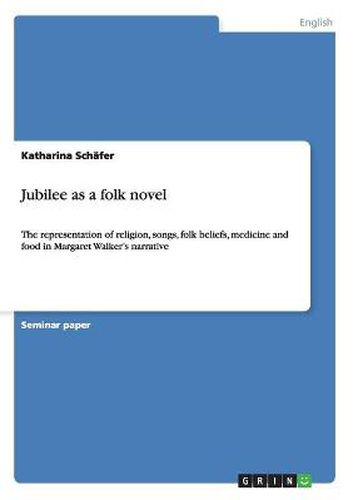Readings Newsletter
Become a Readings Member to make your shopping experience even easier.
Sign in or sign up for free!
You’re not far away from qualifying for FREE standard shipping within Australia
You’ve qualified for FREE standard shipping within Australia
The cart is loading…






Seminar paper from the year 2007 in the subject English Language and Literature Studies - Literature, grade: 1,5, University of Cologne, course: Einfuhrungsseminar Literaturwissenschaft Teil B: The Neo-Slave Narrative, 13 entries in the bibliography, language: English, abstract: On nearly 500 pages Margaret Walker tells the story of her great-grandmother. Jubilee is the story about Vyry, a black female slave who longs for freedom and finally gains it, at least officially, after the Civil War years. Besides this individual destiny, the novel contains historical sections and information about political developments during that time, several complex characters in addition to Vyry and inside views even of white characters, detailed descriptions of the slaves’ everyday life, their family structures, their language and their hierarchies. My term paper will deal with those elements which turn Jubilee into a folk novel, i.e. an account of African American traditions which were passed from generation to generation orally. It was clear to me that Walker had intended to write a kind of folk novel when I read her dedication: She dedicated her first and only novel to her family, especially to her four children so that they may know something of their heritage . Apparently, family boundaries and traditions do not only play a major role in the novel but also did in Walker’s own life. After reading Walker’s essay How I wrote Jubilee there was further evidence found for my initial intuition. There she mentions: I always intended Jubilee to be a folk novel based on folk material: folk sayings, folk belief, folkways. (Walker 1973: 62). Furthermore, the origin of Jubilee is a piece of oral tradition itself. According to the same essay, her grandmother had told her stories about slave life in Georgia ever since she was a child (Walker 1973: 51). As an adult she carried out a long-lasting research because she was determined to authenticate the story I had heard from my grandmother
$9.00 standard shipping within Australia
FREE standard shipping within Australia for orders over $100.00
Express & International shipping calculated at checkout
Seminar paper from the year 2007 in the subject English Language and Literature Studies - Literature, grade: 1,5, University of Cologne, course: Einfuhrungsseminar Literaturwissenschaft Teil B: The Neo-Slave Narrative, 13 entries in the bibliography, language: English, abstract: On nearly 500 pages Margaret Walker tells the story of her great-grandmother. Jubilee is the story about Vyry, a black female slave who longs for freedom and finally gains it, at least officially, after the Civil War years. Besides this individual destiny, the novel contains historical sections and information about political developments during that time, several complex characters in addition to Vyry and inside views even of white characters, detailed descriptions of the slaves’ everyday life, their family structures, their language and their hierarchies. My term paper will deal with those elements which turn Jubilee into a folk novel, i.e. an account of African American traditions which were passed from generation to generation orally. It was clear to me that Walker had intended to write a kind of folk novel when I read her dedication: She dedicated her first and only novel to her family, especially to her four children so that they may know something of their heritage . Apparently, family boundaries and traditions do not only play a major role in the novel but also did in Walker’s own life. After reading Walker’s essay How I wrote Jubilee there was further evidence found for my initial intuition. There she mentions: I always intended Jubilee to be a folk novel based on folk material: folk sayings, folk belief, folkways. (Walker 1973: 62). Furthermore, the origin of Jubilee is a piece of oral tradition itself. According to the same essay, her grandmother had told her stories about slave life in Georgia ever since she was a child (Walker 1973: 51). As an adult she carried out a long-lasting research because she was determined to authenticate the story I had heard from my grandmother